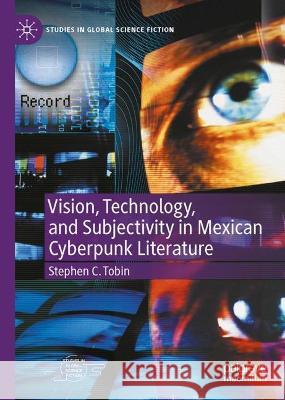Vision, Technology, and Subjectivity in Mexican Cyberpunk Literature » książka
Vision, Technology, and Subjectivity in Mexican Cyberpunk Literature
ISBN-13: 9783031311550 / Angielski
Vision, Technology, and Subjectivity in Mexican Cyberpunk Literature
ISBN-13: 9783031311550 / Angielski
(netto: 461,12 VAT: 5%)
Najniższa cena z 30 dni: 462,63
ok. 16-18 dni roboczych.
Darmowa dostawa!
Vision, Technology and Subjectivity in Mexican Cyberpunk Literatureinterrogates an array of cyberpunk and post-cyberpunk science fiction novels and short stories from Mexico whose themes engage directly with visual technologies and the subjectivities they help produce – all published during and influenced by the country’s neoliberal era. This book argues that television, computers, and smartphones and the literary narratives that treat them all correspond to separate-yet-overlapping scopic regimes within the country today. Amidst the shifts occurring in the country’s field of vision during this period, the authors of these cyberpunk and post-cyberpunk narratives imagine how these devices contribute to producing specular subjects—or subjects who are constituted in large measure by their use and interaction with visual technologies. In doing so, they repeatedly recur to the posthuman figure of the cyborg in order to articulate these changes; Stephen C. Tobin therefore contends that the literary cyborg becomes a discursive site for working through the problematics of sight in Mexico during the globalized era. In all, these “specular fictions” represent an exceptional tendency within literary expression—especially within the cyberpunk genre—that grapples with themes and issues regarding the nature of vision being increasingly mediated by technology.
Vision, Technology and Subjectivity in Mexican Cyberpunk Literature interrogates an array of cyberpunk and post-cyberpunk science fiction novels and short stories from Mexico whose themes engage directly with visual technologies and the subjectivities they help produce – all published during and influenced by the country’s neoliberal era. This book argues that television, computers, and smartphones and the literary narratives that treat them all correspond to separate-yet-overlapping scopic regimes within the country today. Amidst the shifts occurring in the country’s field of vision during this period, the authors of these cyberpunk and post-cyberpunk narratives imagine how these devices contribute to producing specular subjects—or subjects who are constituted in large measure by their use and interaction with visual technologies. In doing so, they repeatedly recur to the posthuman figure of the cyborg in order to articulate these changes; Stephen C. Tobin therefore contends that the literary cyborg becomes a discursive site for working through the problematics of sight in Mexico during the globalized era. In all, these “specular fictions” represent an exceptional tendency within literary expression—especially within the cyberpunk genre—that grapples with themes and issues regarding the nature of vision being increasingly mediated by technology.











